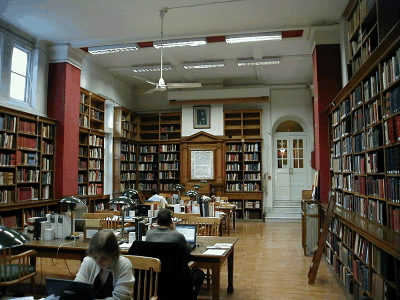
British School at Athens
The British School at Athens (BSA) (Greek: Βρετανική Σχολή Αθηνών) is an institute for advanced research, one of the eight British International Research Institutes supported by the British Academy,[6] that promotes the study of Greece in all its aspects. Under UK law it is a registered educational charity,[7] which translates to a non-profit organisation in American and Greek law. It also is one of the 19 Foreign Archaeological Institutes defined by Hellenic Law No. 3028/2002, "On the Protection of Antiquities and Cultural Heritage in General," passed by the Greek Parliament in 2002. Under that law the 17 accredited foreign institutes may perform systematic excavation in Greece with the permission of the government.
Founder(s)
The Prince of Wales, later Edward VII, called the foundation meeting in 1883[1]
1886, the year the completed building was opened for business, and the tenancy of the first Director began
"to promote the study of Greece in all its aspects."[2]
"to provide facilities for those engaged in research into anthropology, archaeology, archaeometry, architecture, art, environment, geography, history, language, literature, religion and topography pertaining to Greek lands in all periods including modern times."[2]
£2,242,453 in mid-2018[4]
Fitch Research Laboratory
Knossos Research Center
Library
"The British School at Athens ... is a registered charity (no. 208673) in English law, and is governed by trust deed."[5]
52 Souedias Street
Athens, 10676
+30 211 1022 801
The School was founded in 1886 as the fourth such institution in Greece (the earlier being the French, German, and American). For most of its existence, it focused on supporting, directing and facilitating British-based research in Classical Studies and Archaeology, but in recent years, it has broadened that focus to all areas of Greek Studies. It has made notable contributions in the fields of epigraphy and the history of Modern Greece.
It is defined by Hellenic law to be a "foreign archaeological school" with a very specific meaning. In addition to being trusted with antiquities in Greece, it serves as an agent for the Hellenic utilisation of British resources in Greece. Only the BSA can assign projects to British institutions, and it may only do so with permission of the Minister of Culture.[2]
The BSA's activities include a regular programme of lectures and seminars, a series of scholarships and bursaries, Athens-based courses for undergraduates, postgraduates and teachers, as well as archaeological fieldwork. The Directors, who have included many distinguished figures, have tended to be in Greece for only part of the year, keeping roles in the UK or elsewhere.
Women in the BSA[edit]
Eugénie Sellers Strong was the first woman student to be admitted to the BSA in 1890, four years after its foundation.
Agnes Conway was admitted to the British School at Athens under Director Alan Wace for the 1913-1914 session, along with her friend Evelyn Radford with whom she had attended Newnham College, Cambridge. The trip they took to the Balkans during the session was published in 1917 as A Ride Through the Balkans: On Classic Ground with a Camera.[12] Agnes Conway married architect-archaeologist George Horsfield in 1932.
There have been three female Directors of the BSA out of 24 in total. Rebecca Sweetman assumed the position in September 2022.[13]